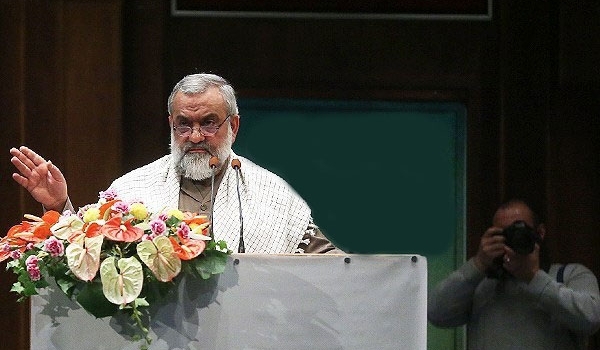Basij Commander: US Untrustworthiness Proved by Washington Officials’ Post-Lausanne Remarks

Commander of Iran’s Basij (volunteer) Force Brigadier General Mohammad Reza Naqdi said that the remarks made by American officials about the Lausanne Statement issued jointly by Iran and the six world powers display that the US is an untrustworthy partner to any deal.
“The remarks made not only by the US political faction, but also by State Department’s officials who speak cautiously due to the nature of their jobs clearly reiterates their untrustworthiness,” Brigadier General Naqdi said, addressing a ceremony in the Northeastern city of Mashhad on Friday.
He said the Americans defy their agreements and do not comply with their undertakings due to their wrong impression of the effects and efficiency power of the sanctions.
After nine days of hard work in Lausanne, Switzerland, Iran and the G5+1 reached an understanding on April 2 which laid the ground for them to start drafting the final nuclear deal over Tehran’s nuclear energy program ahead of a July 1 deadline.
After reading a joint statement issued by Iran and the six world powers to a joint press conference with EU foreign policy chief Federica Mogherini on April 2, Iranian Foreign Minister Mohammad Javad Zarif warned that Tehran will reciprocate any violation of the final nuclear deal by the six world powers with similar action.
Speaking to reporters subsequent to a joint press conference with EU foreign policy chief Federica Mogherini in Lausanne, Zarif said the agreements and the shared understanding developed in the last eight days of talks will be the basis for working out a final nuclear deal after the inclusion of details and mechanisms for implementing them.
Zarif reiterated that a final deal should be worked out in the next three months.
He said Iran is committed to the documents that it signs and expects the six world powers to do the same.
Zarif said work will continue by the seven nations “to proceed based on their present shared understanding”, adding that the seven nations should look ahead with optimism “and if any problem arises, we should sit and talk based on mutual respect, and then move ahead”.
Asked about Iran’s possible reaction if the opposite side defies its undertakings under the pretext of having a different interpretation of the solutions gained, he said that the seven nations party to the nuclear talks might present today’s agreement in different ways as they see fit.
“What was agreed as different solutions to achieve a comprehensive joint plan of action is based on a win-win approach that will end the sanctions against Iran.”
“Iran’s nuclear program will continue, but we will adopt measures to build confidence at international level,” he added.







